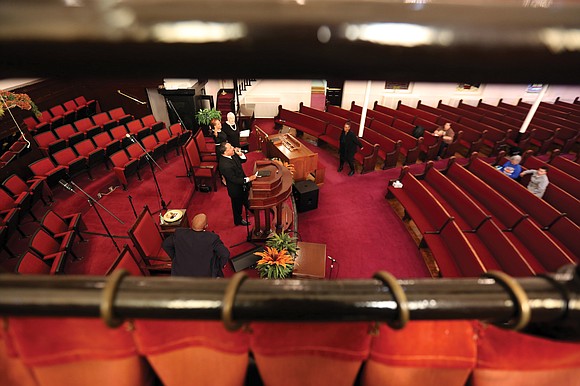Churches change their sermon delivery, tithing methods for mandate guidelines
George Copeland Jr. | 3/26/2020, 6 p.m.

Churches across Richmond have undergone a substantial transformation in the wake of the coronavirus pandemic as state and national officials have forced them to adopt a new paradigm.
For Dr. Rodney D. Waller, senior pastor of First African Baptist Church, the transition from delivering sermons to a packed and eager con-gregation to a sparse ensemble inside the North Side church and others largely following via video stream on social media and the church’s website has been an adjustment.
“This week has been a change,” Dr. Waller said. “However, we view this the same way as if we are challenged with inclement weather. We are just challenged with a longer period of an alternate worship approach.”
First African Baptist Church is just one of many area churches that have turned to alternate means to continue their ministry. Some have gotten creative, with The Tower Ministries, a Pentecostal church in South Side, hosting outdoor services that allow for a communal feel while maintaining social distancing and limits on the number of people gathered as recommended by health officials and government authorities.
By and large, however, churches seem to be relying more on the online space to continue services. This wider usage of streaming video also extends to other weekly meetings and discussions essential to church operations, from Bible study to diaconate meetings and daily prayer.
“The pandemic that is the coronavirus is real,” said Dr. Adam L. Bond, pastor-elect of Ebenezer Baptist Church in Jackson Ward, in a video to his congregation outlining future plans. “Our nation will feel its impact beyond these immediate circumstances. The challenge before us now is how we reinvent how to gather as a family of faith.”
But some church operations, such as outreach services, are not so easily adapted to cell phone and laptop screens. While most churches have canceled community-focused groups and events, others like St. Philip’s Episcopal Church are looking to maintain food pantries and community
breakfast, with an increased focus on hygiene that will allow them to serve Richmond’s vulnerable without risking their health.
“This is a fluid situation so we will let you know as things change,” wrote Rev. Marlene E. Forrest, priest-in-charge of St. Philips, in a post on the church’s website. “We share in the uncertainty and tenuousness of this time, and we ask for strength of mind, body and spirit.”
Another question confronting congregations is how to handle tithes, offerings and other financial contributions. That question goes beyond whether to continue to accept cash and checks or switch to online payment options, but how to use the money collected when the ministry groups activities typically supported have been canceled for weeks or even months.
Churches are pointing their congregation to services like Givelify, Paypal and their church website for ways to contribute, in addition to by the U.S. Postal Service. The money, by most accounts, will be held to handle the churches’ normal expenses and outreach services, with no real change, regardless of how long the corona- virus’ presence lasts.
“We plan to allocate funds to our budget line items to handle our responsibilities as usual,” Dr. Waller said. “This pandemic does not exclude us from being faithful to our obligations.”
While this week seems to have been a smooth transition for most churches given the circumstances, that may not last. Major events are on the horizon for the Christian community, with Palm Sunday on April 5 and Easter Sunday on April 12. Both typically involve a level of celebration and contribution that may be more difficult because of the pandemic.
If Dr. Waller’s statements are any indication, most churches are still working out the details. “As we look at Palm Sunday and Easter
Sunday, we have not made or finalized any plans,” Dr. Waller said, “as we wait to see the status of this coronavirus effect on this city and the nation.”
For now, many of Richmond’s churches are left to hope for the best, plan for the worst and act on faith.





